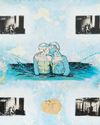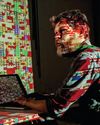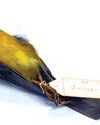
The first Bienal de São Paulo, in 1951, was the product of the USA’s dominance in the postwar world. It was organised by the Museum of Art São Paulo (MASP), the institution itself founded just five years earlier by industrialist Ciccillo Matarazzo in close conversation with his friend Nelson Rockefeller. The latter, by then heading a cultural division of the American government, and with close ties to the CIA, had already helped fill MASP with work by artists labelled ‘new Americans’ and ‘Europeans in Exile’. The biennial was Matarazzo and Rockefeller’s next big soft-power project aimed squarely against the spectre of communism.
Over 70 years later, the 35th edition of the Bienal promises to be an altogether different affair, looking instead, the curators say, to artists from the ‘Global South’. In that, the Bienal curators are not alone: Videobrasil, a biennial survey of (primarily) moving image, which will open in October, has used the term in its artist-selection criteria since the São Paulo-based festival’s inception, in 1991. Raphael Fonseca, who is cocurating Videobrasil, calls the Global South “a fictional idea of community, knowledge and creators that can contrast with the hegemonic North”, useful even in its construction.
This story is from the September 2023 edition of ArtReview.
Start your 7-day Magzter GOLD free trial to access thousands of curated premium stories, and 9,000+ magazines and newspapers.
Already a subscriber ? Sign In
This story is from the September 2023 edition of ArtReview.
Start your 7-day Magzter GOLD free trial to access thousands of curated premium stories, and 9,000+ magazines and newspapers.
Already a subscriber? Sign In

"One day this boy..."
How David Wojnarowicz gave me life

Art Encounters Biennial My Rhino is Not a Myth: art science fictions
Various venues, Timişoara 19 May-16 July

Southern Discomfort
A series of upcoming biennials promise to explore the art of the 'Global South'. But what does that mean? And is the term of any practical use?

Casey Reas
Crypto has crashed and burned, but NFT visual culture is the better for it, and here's why, says the pioneering artist and programmer

Isabelle Frances McGuire
Through kitbashing and the hacking of readymades, an artist explores what digital visual culture might look like in material form

No pain, no gain?
What's primary about Matthew Barney's SECONDARY

Fine Young Cannibals
A spate of recent glitzy films have asked us to eat the rich. But what, asks Amber Husain, are we really swallowing?

Mutant Media
Animation and gaming design studios aren’t just for entertainment, claims Jamie Sutcliffe, they’re a geneticist’s lab for producing our spliced bio- cybernetic future

Midcareerism
What's an artist to do when no longer dewy and not yet long in the tooth? Martin Herbert surveys the options, none of them pretty

Diego Marcon
\"In general when I work, it's not like I'm looking for something and I find moles, it's more like moles find me, they pop up. I don't know why, I just try to remain open to these kinds of visit\"